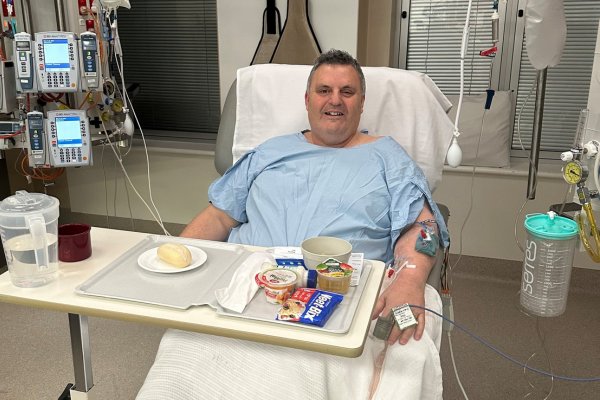About
Damian’s battle with sepsis
- Home
- About
- Latest news
- Damian’s battle with sepsis

17 September 2024
Damian woke up on Thursday morning with pain in one side of his back. Previous experience with kidney stones made him think it was nothing more than that.
As the day went on, the pain grew stronger and Damian felt worse. After speaking to his GP, Damian got a urine test and some antibiotics. The medicine helped for a while but Damian’s condition worsened as the night progressed.
At 6am on Friday Damian’s wife, Michelle, called 000. They connected Damian with the paramedic, who then connected Damian to the virtual ED triage doctor. After some discussions, it was the ED triage doctor who advised Damian to go to the hospital immediately.
At 8am Damian’s family drove him to Austin Health’s Emergency Department and within minutes Damian was triaged and transferred to a bed. His pulse was very weak and his blood pressure was so low that the treating nurse had to measure it directly through his vein. After some investigations, the ED team identified the issue as a septic shock and transferred Damian to the ICU.
Dr Carys Jones, the treating clinician, was extremely worried about Damian’s condition and ordered a comprehensive set of tests to identify the infection. The results showed that Damian had a kidney stone that had become infected causing a serious condition called sepsis.
Sepsis happens when the body’s immune system has an extreme response to an infection. The body’s reaction to the infection causes damage to its own tissues and organs. Damian’s infection was severe and delay in treatment could have resulted in organ dysfunction.
Carys explains, "Sepsis is extremely challenging to diagnose - there is no one single gold sign or symptoms which clinicians can confidently use to confirm sepsis. It can present in a myriad of ways and requires inquisition by means of history taking, examination and investigation to diagnose.”
“To add to the challenge, to prevent irreversible organ failure prompt recognition and timely treatment of the infection with antibiotics and source control is a clinical priority. The diagnosis therefore carries a time pressure in terms of its recognition,” she adds.
Damian is now well. He shares, “It all happened so quickly, from the pain starting on Thursday morning to going to the ED on Friday morning and then the ICU. By Sunday I was feeling 200 per cent better thanks to the doctors, consultants and nurses who looked after me so diligently and with such care. They kept checking in on me and also on my family, which was very reassuring.”


